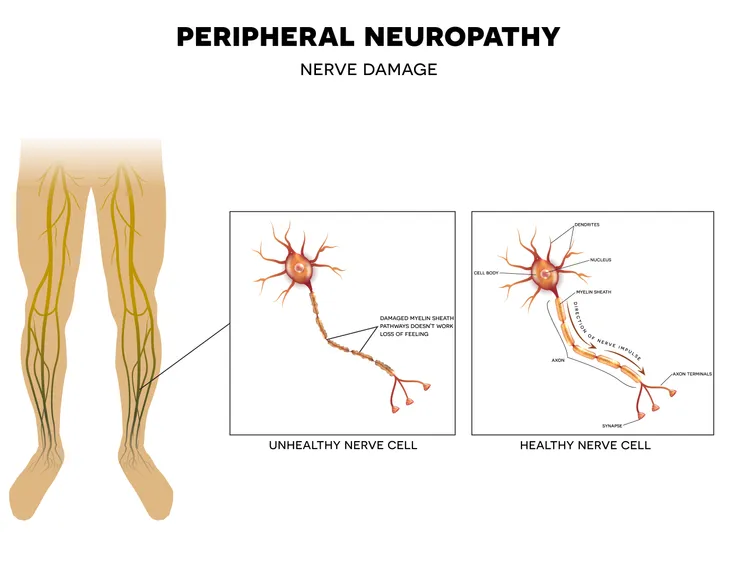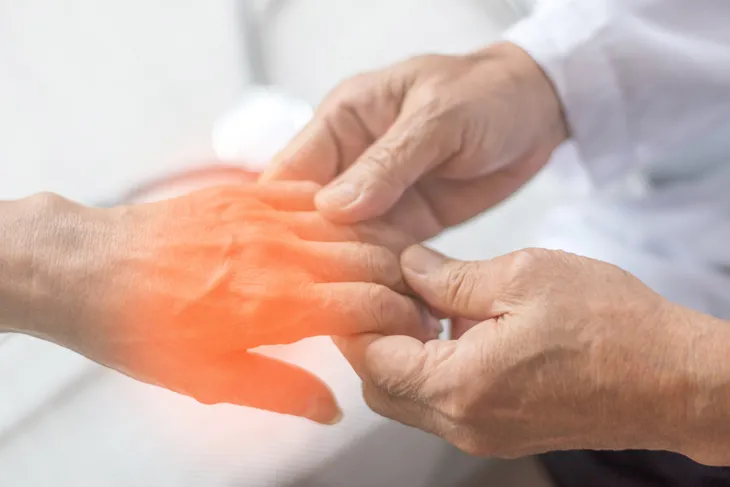Your peripheral nervous system consists of a complex network of nerves that connects the brain and spinal cord to the muscles, skin, and internal organs. It has the vital job of sending information from your brain and spinal cord (or central nervous system) to the rest of your body. If these nerves become damaged or diseased, you can develop a disorder called peripheral neuropathy.
Peripheral neuropathy can impair muscle movement, prevent normal sensation in your arms and legs, and even cause pain. Early diagnosis is essential for managing the symptoms and for preventing any further damage to your peripheral nerves. This is why knowing the warning signs are so important. Follow along as we explore the signs, symptoms, causes, and treatment options for peripheral neuropathy.
What Is Peripheral Neuropathy?
Peripheral neuropathy is a disorder that happens when your nerves malfunction because they’re either damaged or destroyed. When this happens, your nerves don’t function as they should. This could result in false signals of pain when nothing is actually causing you pain.
In contrast, your nerves might not send any pain signals, even when something is harming you. Peripheral neuropathy is uncomfortable, however, there are treatments available that can be very helpful.
Types of Peripheral Neuropathy
Over 100 types of peripheral neuropathy exist. Each type has its own unique set of symptoms and prognosis. Since there are so many types, they’re often broken down into four categories. Here are the four categories:
- Sensory neuropathy affects your sensory nerves, which connect to your skin and control what you feel. This includes pain, temperature, and touch.
- Motor neuropathy involves damage to the nerves, that control muscles and movement in your body.
- Autonomic nerve neuropathy affects the autonomic nerves which connect to your internal organs. These nerves control functions that you’re not conscious of, including breathing and heartbeat. If you experience damage to these nerves, it can be very serious.
- Combination neuropathies include a combination of two or three types of neuropathies.
Common Signs and Symptoms of Peripheral Neuropathy
Symptoms of peripheral neuropathy will vary based on the type that you have and the part of the body that is affected. Symptoms can range from mild symptoms, such as tingling or numbness, to more serious symptoms, such as burning pain or even paralysis. Here are some of the common symptoms of peripheral neuropathy:
- Numbness or tingling in the hands or feet
- Muscle weakness or twitching
- Sharp stabbing pains
- Loss of feeling in certain body parts
- Loss of balance
- Trouble eating or swallowing
- Emotional distress
- Sleep disruptions
- Loss of pain or sensation
- Dizziness or lightheadedness
- Diarrhea or constipation
- Difficulty breathing
- Irregular heartbeat
When To See a Doctor
If you ever notice tingling, weakness, or any of the above symptoms, make sure you seek medical care right away. Early diagnosis is essential for preventing further damage to your peripheral nerves. Getting treatment right away is also important for controlling your symptoms.
Before you speak with your doctor, make a list of all of your symptoms and questions you may have. Your doctor will be able to determine the best course of action for you.
Causes of Peripheral Neuropathy
There are many different causes of peripheral neuropathy. People who have a family history of this disorder are more likely to develop it. Other people may develop the disorder due to an injury or from another disorder.
In many cases, another underlying condition leads to peripheral neuropathy. This includes problems such as hormone imbalances or a kidney condition.
The most common cause of peripheral neuropathy in the U.S. is diabetes. In fact, 60 to 70-percent of people with diabetes have a mild form of damage to their motor, sensory, and autonomic nerves. This often causes symptoms such as tingling, burning, or numb feet, as well as numbness and weakness in the trunk or pelvis.
Diagnosing Peripheral Neuropathy
To diagnose peripheral neuropathy, your doctor will need to perform a physical exam. They’ll also ask about your medical history. If your doctor is unable to determine whether your symptoms are caused by peripheral neuropathy from a physical exam, they’ll need to perform other tests. These include:
- Blood tests to help determine whether your thyroid is functioning as it should.
- You may also require a computed tomography (CT) scan or magnetic resonance imaging (MRI) to find out if anything is pressing on a nerve, such as a tumor or a herniated disk.
- A nerve biopsy may also be necessary. This is a minor surgery that requires removing a small amount of nerve tissue to examine under a microscope.
Treatment Options for Peripheral Neuropathy
Unfortunately, in most cases, peripheral neuropathy cannot be cured. However, there are several things you can do to prevent it from getting worse. If an underlying condition is causing the disorder, your doctor will first treat that followed by treating the pain or other symptoms of peripheral neuropathy.
Your doctor may recommend over-the-counter pain relievers or may prescribe medication to help with the pain. Currently, there are two medications approved by the U.S. Food and Drug Administration (FDA) for the treatment of peripheral neuropathy related to diabetes. Finally, in extreme cases, your doctor may recommend surgery. This is performed to destroy nerves or repair injuries that are causing your symptoms.
How To Manage Peripheral Neuropathy
Even though this disorder can’t be cured, there are some changes you can make to help manage the disorder. A healthy lifestyle can go a long way to help you feel your best and reduce the symptoms associated with peripheral neuropathy.
If you smoke, quitting can help you manage the disorder. It’s also important not to let injuries go untreated and be diligent about taking care of your feet. You may also find relaxation techniques such as yoga or meditation may help ease the physical and emotional symptoms associated with the disorder.
What You Can Do at Home
Having peripheral neuropathy can put you at a greater risk for accidents at home. Thankfully, there are a variety of things you can do to help improve your safety. For starters, always wear shoes in the house to protect your feet.
Next, keep your floor clear to avoid tripping. It may also be a good idea to install handrails in your tub or shower and use bath mats to prevent slipping. It’s also a good idea to check the water temperature with your elbow (not your hand or your foot).
Don’t stay in one position for too long, and instead, get up and move around a couple of times each hour. Finally, you may also find wearing a foot brace beneficial, as it can help make up for muscle weakness.
How To Prevent Peripheral Neuropathy
If you have a family history of peripheral neuropathy or an underlying condition that may lead to this disorder, there are some lifestyle changes you can make to help. For starters, avoiding alcohol or, at the very least drinking alcohol only in moderation can help.
Furthermore, eating a healthy diet, exercising regularly, losing weight, and correcting vitamin deficiencies may also help. Finally, if you have diabetes, take extra care of your feet by inspecting them daily and always keeping the skin moist. Making these changes can be vital to preventing or delaying the onset of peripheral neuropathy.













